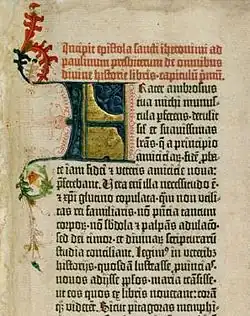Portal:Bible
The Bible Portal

The Bible is a collection of religious texts that are central to Christianity and Judaism, and esteemed in other Abrahamic religions such as Islam. The Bible is an anthology (a compilation of texts of a variety of forms) originally written in Hebrew (with some parts in Aramaic) and Koine Greek. The texts include instructions, stories, poetry, prophecies, and other genres. The collection of materials accepted as part of the Bible by a particular religious tradition or community is called a biblical canon. Believers generally consider it to be a product of divine inspiration, but the way they understand what that means and interpret the text varies.
The religious texts, or scriptures, were compiled by different religious communities into various official collections. The earliest contained the first five books of the Bible, called the Torah ('Teaching') in Hebrew and the Pentateuch (meaning 'five books') in Greek. The second-oldest part was a collection of narrative histories and prophecies (the Nevi'im). The third collection, the Ketuvim, contains psalms, proverbs, and narrative histories. Tanakh (Hebrew: תָּנָ״ךְ, romanized: Tanaḵ) is an alternate term for the Hebrew Bible, which is composed of the first letters of the three components comprising scriptures written originally in Hebrew: the Torah, the Nevi'im ('Prophets'), and the Ketuvim ('Writings'). The Masoretic Text is the medieval version of the Tanakh—written in Hebrew and Aramaic—that is considered the authoritative text of the Hebrew Bible by modern Rabbinic Judaism. The Septuagint is a Koine Greek translation of the Tanakh from the third and second centuries BCE; it largely overlaps with the Hebrew Bible.
Christianity began as an outgrowth of Second Temple Judaism, using the Septuagint as the basis of the Old Testament. The early Church continued the Jewish tradition of writing and incorporating what it saw as inspired, authoritative religious books. The gospels, which are narratives about the life and teachings of Jesus, along with the Pauline epistles, and other texts quickly coalesced into the New Testament. The oldest parts of the Bible may be as early as c. 1200 BCE, while the New Testament had mostly formed by 4th century CE.
With estimated total sales of over five billion copies, the Christian Bible is the best-selling publication of all time. The Bible has had a profound influence both on Western culture and history and on cultures around the globe. The study of it through biblical criticism has also indirectly impacted culture and history. Some view biblical texts as morally problematic, historically inaccurate, or corrupted by time; others find it a useful historical source for certain peoples and events or a source of ethical teachings. The Bible is currently translated or is being translated into about half of the world's languages. (Full article...)
Selected article -
David (/ˈdeɪvɪd/; Biblical Hebrew: דָּוִד, romanized: Dāwīḏ, "beloved one") was a king of ancient Israel and Judah, according to the Hebrew Bible and Old Testament.
The Tel Dan stele, an Aramaic-inscribed stone erected by a king of Aram-Damascus in the late 9th/early 8th centuries BCE to commemorate a victory over two enemy kings, contains the phrase bytdwd (𐤁𐤉𐤕𐤃𐤅𐤃), which is translated as "House of David" by most scholars. The Mesha Stele, erected by King Mesha of Moab in the 9th century BCE, may also refer to the "House of David", although this is disputed. According to Jewish works such as the Seder Olam Rabbah, Seder Olam Zutta, and Sefer ha-Qabbalah (all written over a thousand years later), David ascended the throne as the king of Judah in 885 BCE. Apart from this, all that is known of David comes from biblical literature, the historicity of which has been extensively challenged, and there is little detail about David that is concrete and undisputed. Debates persist over several controversial issues: the exact timeframe of David's reign and the geographical boundaries of his kingdom; whether the story serves as a political defense of David's dynasty against accusations of tyranny, murder and regicide; the homoerotic relationship between David and Jonathan; whether the text is a Homer-like heroic tale adopting elements from its Ancient Near East parallels; and whether elements of the text date as late as the Hasmonean period. (Full article...)
Did you know (auto-generated) -

- ... that the day before William J. McGarry was set to leave for the Pontifical Biblical Institute, he was instead appointed a professor at Weston College?
- ... that David Kushner based his song "Daylight" on biblical references that inspired him as a child?
- ... that Geoffrey Cuming edited what has been called a gramophone librarian's "Bible"?
- ... that the scriptural phrase "fear and trembling" has been used to celebrate hospitality, explore the nature of faith, and justify slavery?
- ... that a 2021 Dutch translation of the Bible introduces five new animals?
- ... that Samuel Green printed the Eliot Indian Bible, the first Bible printed in British America, in 1663?
List articles
- List of animals in the Bible
- Biblical canon
- List of capital crimes in the Torah
- Prophets of Christianity
- List of English Bible translations
- List of films based on the Bible
- List of minor Old Testament figures, A–K
- List of minor Old Testament figures, L–Z
- List of minor biblical tribes
- List of biblical names
- List of New Testament pericopes
- List of New Testament papyri
- List of New Testament uncials
- Lists of New Testament minuscules
- List of New Testament lectionaries
- List of New Testament verses not included in modern English translations
- List of Hebrew Bible events
- List of Jewish biblical figures
- List of biblical places
- List of plants in the Bible
Related portals
Selected quote -
"He has made everything beautiful in its time. Also He has put eternity in their hearts, except that no one can find out the work that God does from beginning to end." - Ecclesiastes 3:11
Categories

WikiProjects
![]()
- WikiProject Bible
- Biblical criticism work group
- WikiProject Christianity
- WikiProject Judaism
- WikiProject Religious texts
Web resources
- Audio Bible Online
- Bible Hub
- Bible Portal
- BibleGateway.com
- BibleStudyTools.com
- Biblia.com
- Blue Letter Bible
- Free Bible Images
- Multilingual Online Bible
- Remember Me online Bible verse memorisation
- Sefaria Robust translations of the Tanakh
- The Holy Bible, a Standard works of The Church of Jesus Christ of Latter-day Saints.
- New World Translation of the Holy Scriptures A jw.org Jehovah Witnesses portal of New World Translation of the Holy Scriptures.
Topics
More did you know -
- ... that according to the Hebrew Bible, a perjurer should receive the same punishment he sought to inflict on the falsely accused?
- ... that according to one theory, Xia Ruifang was killed for his Chinese translations of the Bible?
- ... that Bible translations into Geʽez date back to at least the 6th century, making them among the oldest in the world?
Selected chapters
Genesis - Exodus - Leviticus - Numbers - Deuteronomy - Joshua - Judges - Ruth - 1 Samuel - 2 Samuel - 1 Kings - 2 Kings - 1 Chronicles - 2 Chronicles - Ezra - Nehemiah - Esther - Job - Psalms - Proverbs - Ecclesiastes - Song of Solomon - Isaiah
Associated Wikimedia
| Bible on Wikiquote Quotes |
Bible on Commons Images |
Bible on Wikisource Texts |
Sources
-
 List of all portals
List of all portals -

-

-

-

-

-

-

-

-

-
 Random portal
Random portal -
 WikiProject Portals
WikiProject Portals

